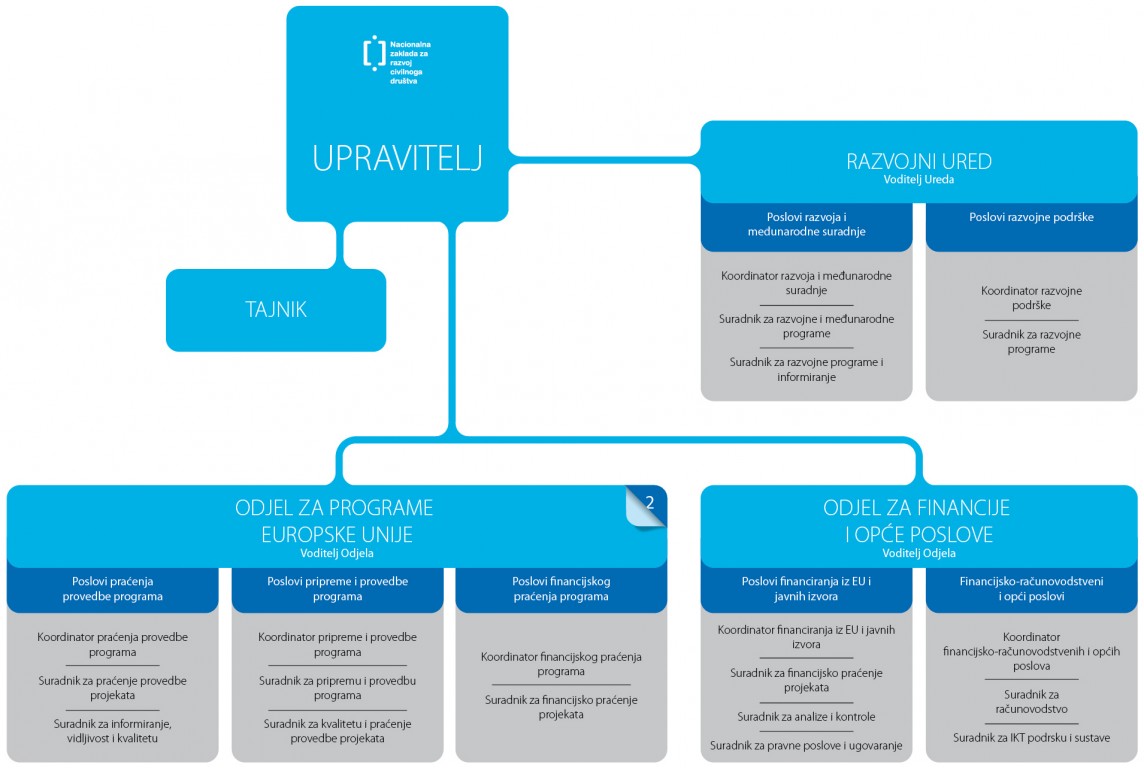Mission, Vision and Goals
The National Foundation for Civil Society Development was founded by a special Act (NN 173/03) by the Croatian Parliament on 16 October 2003, as a public foundation with the basic purpose of promoting and developing the civil society in the Republic of Croatia.
In order to fulfill its basic purpose, the National Foundation offers expert and financial support to programs which encourage the sustainability of the not-for-profit sector, inter-sector cooperation, civil initiatives, philanthropy, voluntary work and the improvement of the democratic institutions of society.
The National Foundation is financed from state budget funds provided in a separate position for the NGO Office, from part of the income from games of chance and competitions and from the founding capital, donations and other income pursuant to Article 16 of the Act on Foundations and Funds.
The Government of the Republic of Croatia, in its ruling of 13 November 2003 (NN 182/03), appointed members of the management board and the director of the National Foundation. The management board has 9 members of which 3 are representatives of bodies of state administration (The Ministry of Finance, the Ministry for European Integration and the Ministry of Science, Education and Sport), one representative of units of local and regional self-government and five representative of organizations and experts in the development of the civil society.
Mission
The mission of the National Foundation is to promote and support civil society development in Croatia.
Vision
Through its activities the National Foundation strives to achieve active citizenship in the development of a modern, democratic and inclusive society in the Republic of Croatia.
Goals
Goals that the National Foundation aims to achieve through its activities are:
- Encouraging citizens to action, involvement and participation in community development;
- Building the capacities of civil society;
- Development of cross-sectoral cooperation and cooperation between civil society organisations;
- Increasing public influence and visibility of the work of civil society organisations;
- Development of social entrepreneurship and employment in the non-profit sector.
The values on which the vision of the National Foundation and its goals are based are: respect for human rights, the public nature of its work, the responsibility of all participants in the development of the community, cooperation and dialogue between all participants in the development of society, availability of information, tolerance and respect for variety and non-violence.
 Shema: The organizational structure of the National Foundation
Shema: The organizational structure of the National Foundation
The National Foundation cooperates with::
a) the public sector:
(bodies of state administration, units of local and regional self-government and other public institutions)
- In drawing up standards and procedures for allocation of funds from the state/local budget aimed at supporting programs and projects of civil society organizations, in accordance with international standards and the principles of openness to the public and responsibility in the allocation and use of public money (introduction of a system of work quality)
- In organizing professional training and education for civil servants in this country and abroad, on opportunities and models of cooperation with civil society organizations in implementing joint projects, strategic planning of priorities in the development of the community and good management
- In organizing and implementing aimed assessment of the needs in the local communities
- In decentralization of financial support for programs and projects of civil society organizations by strengthening capabilities and infrastructure on a regional and local level
- In offering information, professional expertise and writing comparative analyses of international practice and legislative structure and support within the framework of civil society development
- Offering services of professional and independent programs and financial estimates for programs and projects of NGOs and other civil society organizations, financed from central state or local budget funds.
b) the business sector
- In offering expert analysis and information on opportunities to donate/invest in programs and projects by civil society organizations, working for the general good and the sustainable development of the community.
- In organizing and implementing specific needs assessment in local communities
- In creating and strengthening the work of the donors’ forum in the Republic of Croatia
- In offering information on the legal framework in the Republic of Croatia for donations for generally beneficial purposes
- Joint creation and drawing up of proposals for donation/investment programs for generally beneficial purposes, in line with the capabilities and interests of the company/placer of order
- On ensuring the visibility of the donation/investment
- In linking representatives of the business, public and non-governmental – not-for-profit sectors with interested international donors/organizations, for joint projects of support for civil society development and sustainable development of the community
- In the education of management structures in businesses on the possibilities and models for cooperation with civil society organizations as well as inclusion of employees in community development programs according to the model of the social responsibility of businesses
c) Not-for-profit sector / civil society organizations
- In preparation and organization of education modules for the development of the civil society in the Republic of Croatia
- In offering expert and advisory services for the work of civil society organizations
- In organization and financing of research on conditions for development and civil society development in Croatia
- In offering support in building regional and local structures and capacity for civil society development
- In approving financial support for programs and projects which:
a) improve the community through civil initiatives, joint projects/programs and development programs
b) contribute to the democratization and development of the civil society
c) make possible the sustainability of the sector and infrastructure for the development of the civil society through institutional support, capital investment and inclusion in international trends
d) through programs linking together civil society organizations with common platforms of involvement
e) inclusion of civil society organizations in negotiating systems and offers of services in social services, health care and extra-institutional education of children and young people (CARDS project)